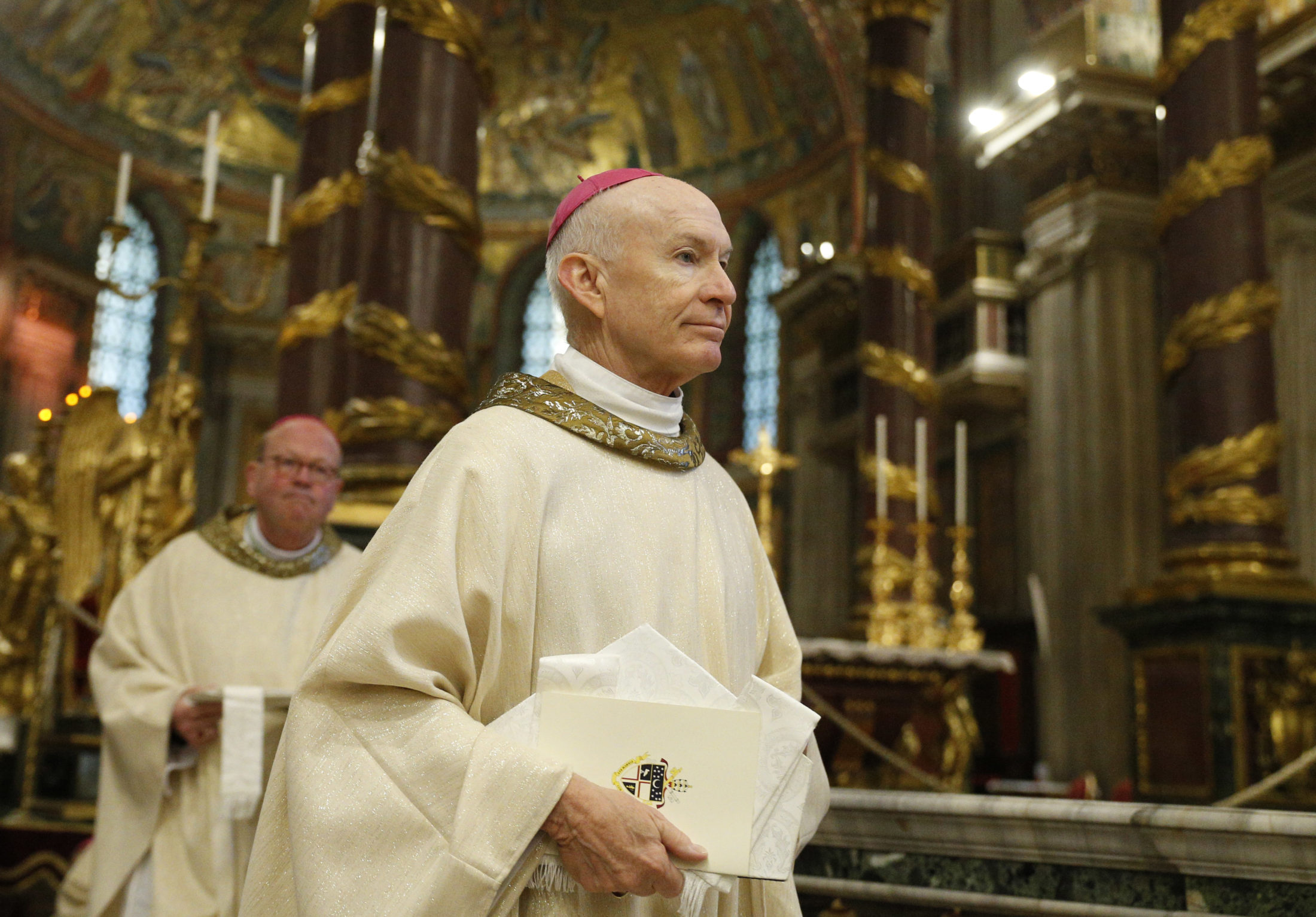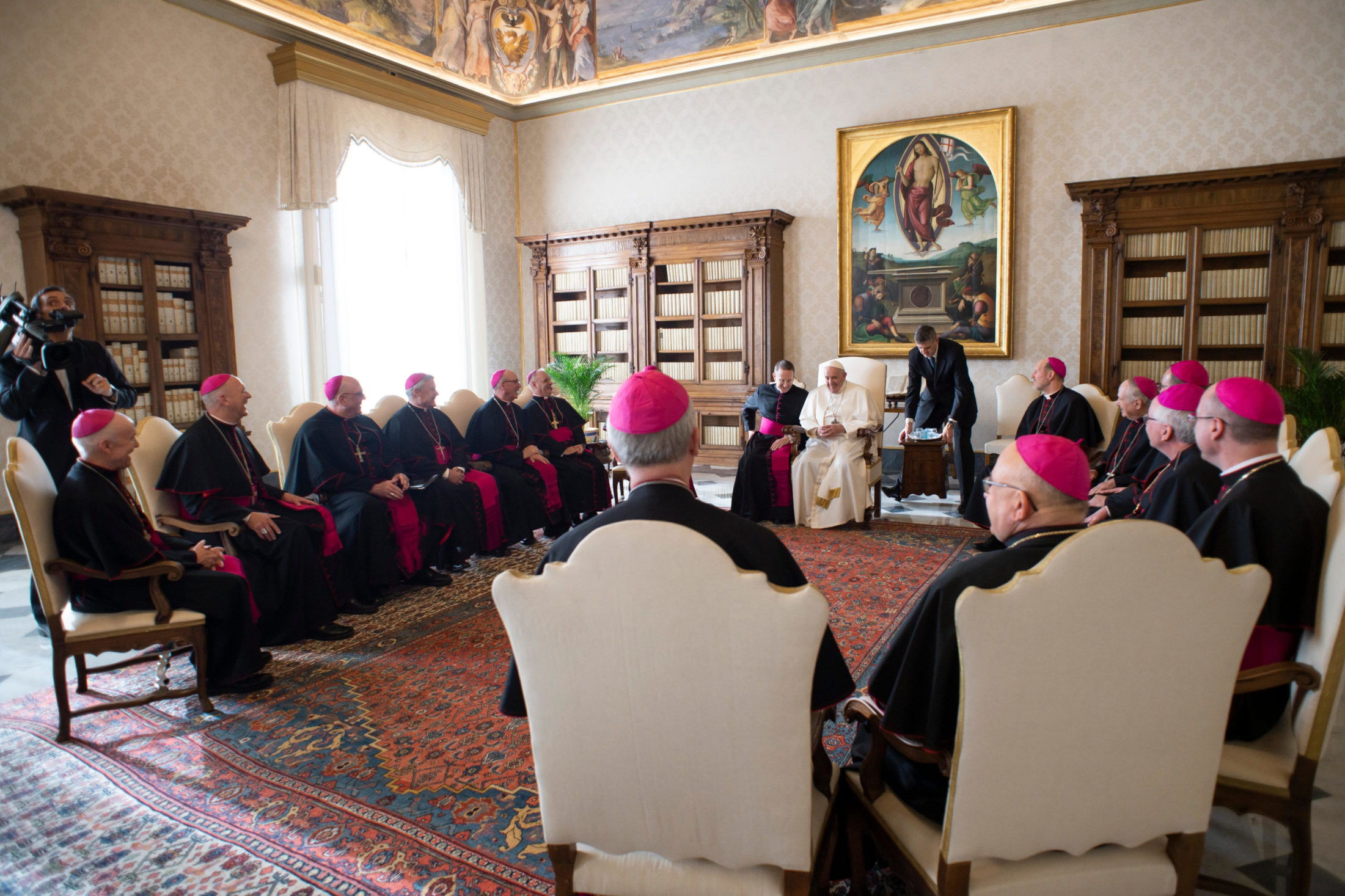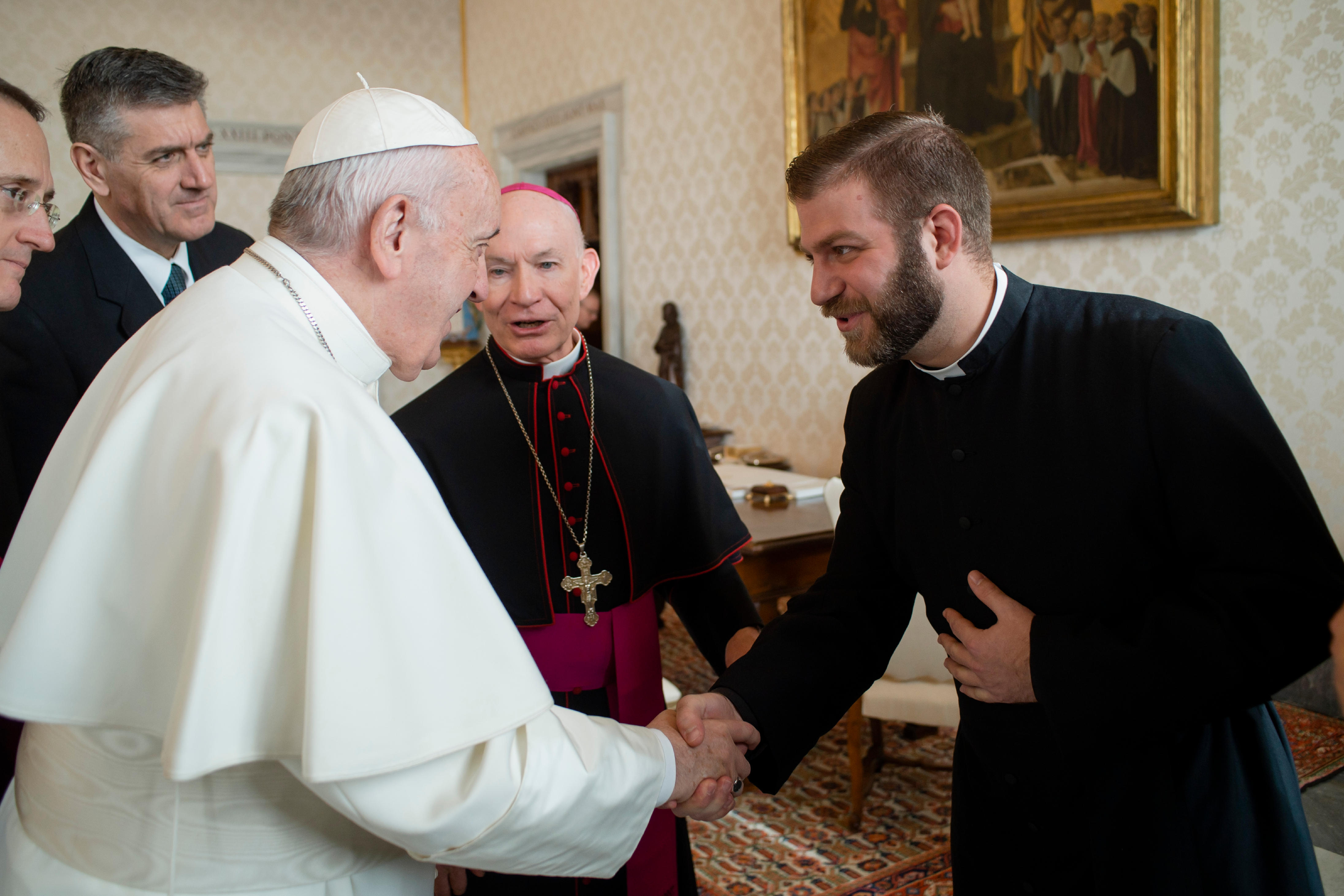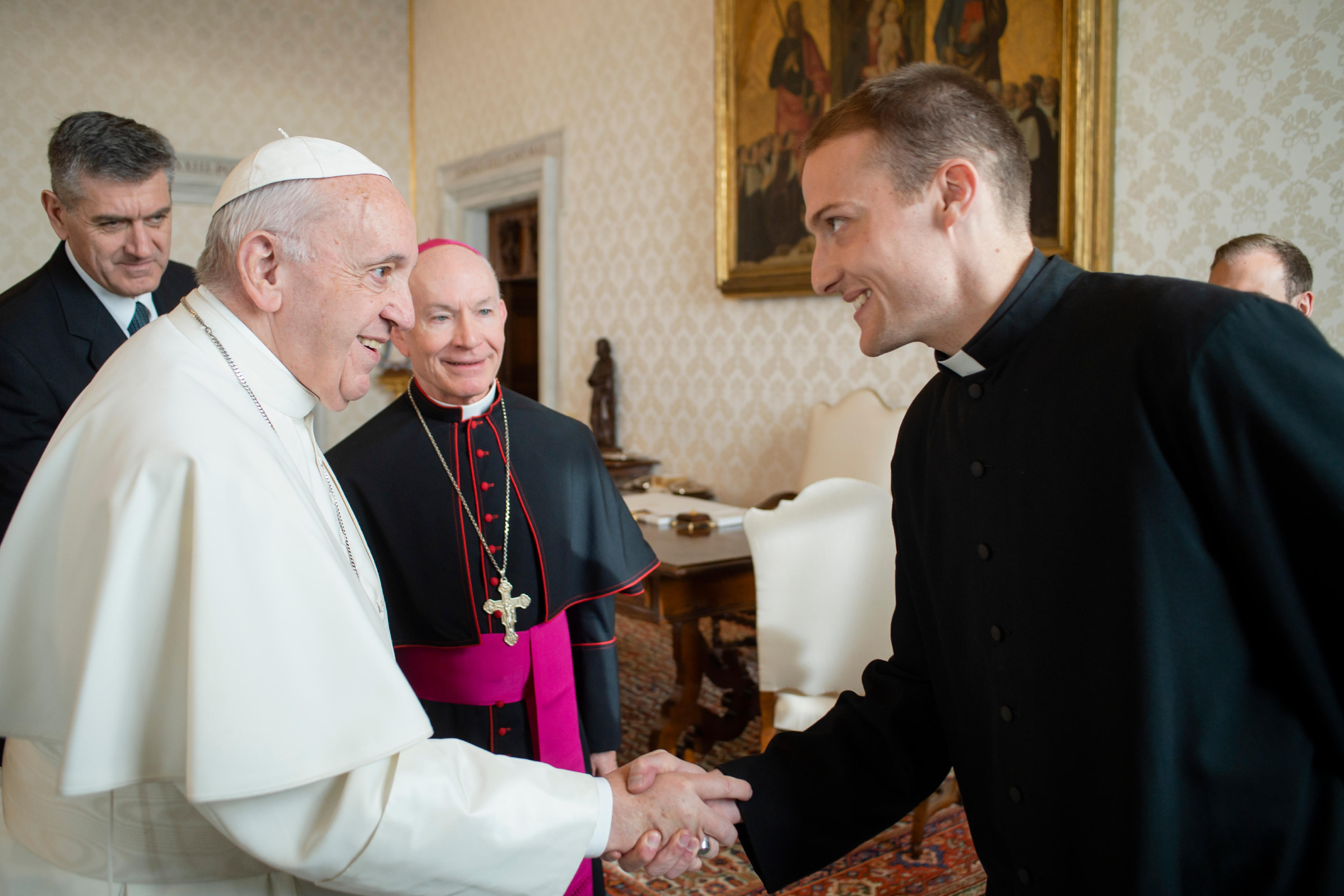
Archbishop George J. Lucas of Omaha, Neb., is pictured after praying at relics of the Nativity after Mass with U.S. bishops from Iowa, Kansas, Missouri and Nebraska at the Basilica of St. Mary Major in Rome Jan. 14, 2020. The bishops were making their “ad limina” visits to the Vatican to report on the status of their dioceses to the pope and Vatican officials. (CNS photo/Paul Haring)
Shepherd's Voice
“To the threshold of the apostles”: Ad limina Q&A with Archbishop Lucas
January 16, 2020
Prior to departing for his quinquennial ad limina pilgrimage, Archbishop Lucas shared his thoughts on the importance of this trip for maintaining the link between local Catholics and the universal Church and for the renewal of his own episcopal ministry.
Q: What is an ad limina visit?
Every 5-6 years or so, each bishop from around the world is expected to pay an official visit to the Holy Father in Rome. The Holy See issues the invitation and schedules the meetings, and the bishops go in groups by country. Because there are so many dioceses and bishops in the United States, it takes several months for all of us to visit with the pope. We meet with him by region, and I will be there with bishops from Nebraska, Kansas, Iowa and Missouri. The official name of the visit is “Ad limina apostolorum,” which translates from Latin as “to the threshold of the apostles.” As you can imagine, meeting with Pope Francis will be the highlight, but there is more to it. We bishops also have the opportunity to visit the places of the martyrdom of St. Peter and St. Paul, as well as to celebrate Mass together in the four major Roman basilicas. We are able to profess the faith that has come down to us from the apostles and to pray for the strength of the Holy Spirit in living and proclaiming the Catholic faith in our role as diocesan pastors.
I have been a bishop for 20 years, and this will be my third ad limina visit. The first was with St. John Paul II. Even as he grew more frail, he insisted on meeting with each bishop individually. So I have a great memory of spending 15 minutes with that saintly pope, just the two of us. I hope that his sanctity is contagious.
My last visit was with Pope Benedict in the final year of his papacy. He met with us in small groups. His English is good and he was very familiar with the United States, so it was a very interactive encounter.
I understand that Pope Francis will meet for 2-3 hours with all of the bishops of our region. I am looking forward to the time with him.
Q: Why is a face-to-face meeting required?
This face-to-face meeting with the Holy Father is important for several reasons. The pope is my immediate superior, and it is an important source of strength and direction to be in his presence. I am serving in the Archdiocese of Omaha, and now for a time in the Diocese of Lincoln, because I have been sent by the pope. So it is good to renew the bonds of connection that can only be made personally.

Pope Francis meets with U.S. bishops from Iowa, Kansas, Missouri and Nebraska during their “ad limina” visits to the Vatican Jan. 16, 2020. The bishops were making their “ad limina” visits to the Vatican to report on the status of their dioceses to the pope and Vatican officials. (CNS photo/Vatican Media).
This is also an opportunity for each bishop to give an account of his stewardship, to talk about the challenges and opportunities found in each diocese. These may vary from place to place, and during these visits the pope is able to keep up with his flock around the world. Finally, while there are many reporters and commentators giving their take on the pope and his leadership, I find that it is important to let Francis be Francis. So being with him, even from just a while, will help deepen understanding and renew the bonds of communion that I know the Lord desires.
Also, bishops take some time to visit the various departments of the Vatican and to speak with those who assist the pope in his work. This, too, is a chance for us to learn more about how to better carry out our responsibilities, as well as to share our experiences from our part of the world.
Q: What do you intend to discuss with the pope?
I don’t presume to know in advance exactly what will be discussed, but I hope to share something about how our efforts to share the joy of the gospel are bearing good fruit here. I’m sure we will all want to talk about the challenge of sharing the gospel and the power of the sacraments with young adults in our communities. I think we also will want to let the pope know the privilege we have of serving side by side with generous, often heroic, priests; in our part of the country, we are blessed with strong families, with dedicated deacons, with zealous women and men in consecrated life and with many lay leaders in families and parishes who live their baptismal vocation faithfully day by day. In the midst of challenges, there is much good news to share.
I also want to assure the Holy Father of the love and the prayers of the people of Nebraska. He has a huge responsibility as our universal pastor, and, like the rest of us, he relies on the support of prayer to remain faithful and joyful.

Archbishop Lucas introduces Rev. Mr. Zach Tucker, seminarian for the Archdiocese of Omaha, to Pope Francis. (Photo: L’Osservatore Romano)

Archbishop Lucas introduces Paul Floersch, seminarian for the Archdiocese of Omaha, to Pope Francis. (Photo: L’Osservatore Romano)
Q: What impact do these pilgrimages have on your personal journey with Christ?
I know that we meet Jesus today, in his integrity, in the Church. We have our personal experiences of him, of course. But it is important that we have more than our own thoughts, as good as they may be. When the Lord established the Church, so that people in every time and place could meet him, he entrusted the community to the care of Peter and the apostles. To meet the successor of Peter, who is also the Vicar of Christ (who stands in a particular way in the place of Christ,) helps my own encounter with Jesus to be more personal. This visit also gives me the opportunity to connect with Saints Peter and Paul, and especially with their willingness to die rather than turn away from Jesus in the end. I will be praying for a deeper conversion for myself and a more generous spirit in my pastoral ministry.
Q: Is there anything else you’d like the faithful to know about this trip?
I will be praying for all in the Archdiocese of Omaha and the Diocese of Lincoln during my visit to Rome. Thank you for allowing me this time to be renewed in my own responsibilities as diocesan pastor. While I am in Rome and after I return, I look forward to sharing some photos and experiences of the visit. Please pray for me as well. God bless you.